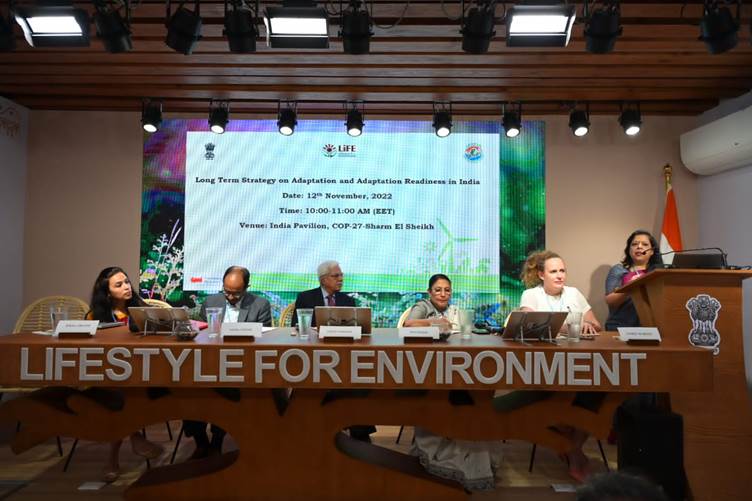Ministry of Environment, Forest and Climate Change
Secretary MoEFCC Participates in a Session on Long Term Strategy on Adaptation and Adaptation Readiness in India at India Pavilion
Adaptation must be at the forefront of development interventions: Secretary MoEFCC
प्रविष्टि तिथि:
13 NOV 2022 9:34AM by PIB Delhi
Secretary Ministry of Environment Forest and Climate Change, Smt Leena Nandan delivered her special remarks at a session on ‘Long Term Strategy on Adaptation and Adaptation Readiness in India’, organised by The Energy and Resources Institute (TERI) at the India Pavilion at COP27 today.

Underscoring the imperative need for finance for adaptation, Ms Leena Nandan, Secretary, pointed out that developing a global baseline to enhance transparency and investor confidence is a crucial measure in enhancing adaptation readiness.
Noting that adaptation must be at the forefront of development interventions, Ms Nandan said, “The institutional arrangement, the action plan and resource mobilization, all have to walk hand-in-hand and see the macro picture through the same lens.” During her address, the Secretary strongly emphasised on the need for information dissemination to strengthen communities for adaptation. When we talk about PPP, we need to redefine it as Pro Planet People, a clarion call given by Prime Minister, she said. We should be able to move in the right direction in a planned and integrated manner. We are cognisant of the challenges that confront us, now is the time for action, she concluded.
Observing that 90 per cent of disasters are related to weather and climate change, Mr Kamal Kishore, Member Secretary, NDMA, and Indian Co Chair, CDRI Executive Committee, emphasized that disaster risk reduction can inform adaptation work. Mr Kishore observed that along with better forecast systems, a deeper engagement with the communities has been the key to disaster risk reduction. He also emphasized the need to update risk assessments.
Emphasising on the need to assess risks sensibly and robustly, Ms Dipa Bagai, Head India Office, NRDC, said, “We need the heat action plans to be implemented with much more alacrity, sensitivity and resources in all the states. Making a good plan is only part of the solution. The important part is that we are able to exercise that solution.”
Taking part in the discussion, Ms. Mardi McBrien, Director of Strategic Alliances, International Sustainability Standard Board (ISSB) said that the board is set out to create one global standard, a global baseline for a global standard of sustainability to develop investors’ confidence and for reporting material, climate and sustainability information to capital markets. ‘It will help move the money from the Global North to developing and emerging economies to help finance the mitigation and adaptation solution,” Ms McBrien added.
Pointing out the need for adaptation mechanisms to be just and inclusive, Ms Rinika Grover, Head Sustainability & CSR, Apollo Tyres, said, “We cannot leave any strata of the community at risk.”
Noting that the extreme weather events witnessed in the past couple of years have been an eye-opener to the deadly impacts of climate change and the urgent need for adaptation, Dr Vibha Dhawan, Director General, TERI, in her welcome address, said, “When it comes to adaptation it is necessary to look into all sectors including food production.”
Identifying the three areas which demand attention in order to enhance the adaptive readiness of India to tackle climate change, Mr RR Rashmi, Distinguished Fellow, TERI, said “It is important to assess the climate risks and vulnerability very clearly; then enhance the adaptative capacity of communities and states to deal with the risks, and finally, the resources.”
A presentation on ‘Adaptation Readiness and Long Term Strategy on Adaptation in India’ was also made by TERI at the event.
*****
HS/SSV
(रिलीज़ आईडी: 1875540)
आगंतुक पटल : 2619